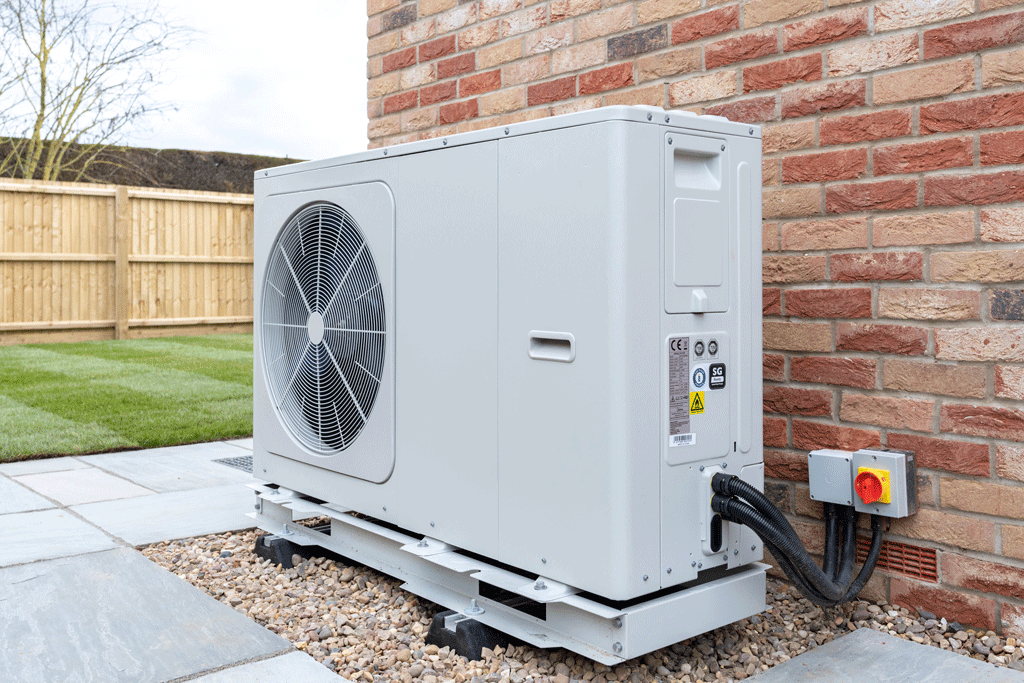Geothermal vs Heat Pump Systems: A Smart Homeowner’s Guide

Have you ever found yourself pondering the differences between geothermal vs heat pump systems for your home?
As a homeowner, understanding these systems is crucial for making informed decisions about your home’s heating and cooling.
Both options offer unique benefits, but which one aligns best with your needs and home environment?
In this article, we delve deep into the world of home heating and cooling, comparing geothermal vs heat pump systems.
We’ll explore their efficiencies, costs, and suitability for different climates, helping you decide which system is the ideal choice for your home.
Whether you’re building a new house or upgrading your existing setup, this guide will provide valuable insights into these two popular heating and cooling solutions.
A Detailed Explanation of Heat Pump vs Geothermal System
Geothermal vs heat pump systems are both innovative solutions for heating and cooling your home, but they operate quite differently.
Understanding these differences is key to determining which system is right for you.
Understanding Geothermal vs Heat Pump Systems
When exploring the topic of geothermal vs heat pump systems, it’s essential to understand the fundamental differences and functionalities of these two popular home heating and cooling solutions. Both systems have their unique features and benefits, making them suitable for different homeowner needs and preferences.
Heat Pump Systems: Versatile and Widely Used
Heat pumps are a widely used solution for heating and cooling homes.
They operate by transferring heat from one place to another. During winter, a heat pump extracts heat from the outside air and transfers it indoors, providing warmth.
Conversely, in the summer months, it reverses the process, removing heat from your home to cool it down. This versatility makes heat pumps a popular choice for homeowners in moderate climates.
However, their efficiency can decrease in extremely cold temperatures, which is a crucial factor for homeowners to consider.
Geothermal Systems: Harnessing Earth’s Energy
Geothermal systems, also known as ground-source heat pumps, take a different approach.
They harness the earth’s consistent underground temperature to regulate your home’s climate. By circulating a water-based solution through buried pipes, geothermal systems absorb or dissipate heat from/to the ground.
This method of using the earth’s stable temperature makes geothermal systems highly efficient and consistent in performance, regardless of the air temperature outside.
Homeowners who install geothermal heating systems benefit from this efficiency, especially in areas with extreme weather conditions.
Also read: Air Conditioning Repair: The Ultimate Guide to Keeping Cool
Comparing Efficiency and Suitability
In comparing geothermal vs heat pump systems, efficiency and suitability for different climates are key factors.
While traditional heat pumps are efficient and cost-effective in milder climates, their performance can suffer in extreme cold.
On the other hand, geothermal systems offer consistent efficiency and performance, regardless of external temperatures, making them ideal for a broader range of climates. However, the initial installation cost and feasibility of installing the necessary underground infrastructure can be higher for geothermal systems.
Understanding the differences between heat pump vs geothermal system is crucial for homeowners making an informed decision about their home heating and cooling needs.
Each system has its advantages and limitations, and the choice largely depends on individual circumstances, including climate, budget, and long-term energy efficiency goals.
Geothermal vs Heat Pump Systems: How Heat Pumps Work
Heat pumps, a pivotal element in the debate of geothermal vs heat pump systems, operate on a simple yet effective principle: transferring heat rather than generating it.
During the colder months, they serve as a lifeline, extracting heat from the brisk outside air and transferring it indoors to provide warmth.
This process is not only efficient but also environmentally friendly, making heat pumps a popular choice among homeowners who install geothermal heating systems.
In the summer, the role of the heat pump reverses, showcasing its versatile nature.
It effectively removes heat from your home, acting much like an air conditioner, and releases it outside, thus maintaining a cool and comfortable indoor environment. This dual functionality makes heat pumps an all-season solution, catering to your heating and cooling needs throughout the year.
Moreover, heat pumps are known for their energy efficiency.
Unlike traditional heating systems that burn fuel to create warmth, heat pumps simply move existing heat, which requires significantly less energy. This efficiency is a key factor in their growing popularity, especially in areas with moderate climates.
As a homeowner, understanding this mechanism is crucial when comparing heat pump vs geothermal system, as it directly impacts your home’s energy consumption and, consequently, your utility bills.
By choosing a heat pump, you’re not only ensuring a comfortable living environment but also contributing to a more sustainable future. This aligns well with the values of homeowners who prioritize efficiency, reliability, and environmental responsibility.
The Science Behind Geothermal Systems
Geothermal systems, a critical component in the heat pump vs geothermal system debate, operate on an ingenious principle that leverages the earth’s stable underground temperature.
Known also as ground-source heat pumps, these systems are a marvel of modern engineering, designed to provide both heating and cooling solutions for your home.
They function by circulating a water-based solution through an intricate network of pipes buried underground. This system absorbs or dissipates heat from or to the ground, depending on the season, making it an incredibly efficient method for regulating indoor temperatures.
The consistent temperature of the earth, typically ranging from 45°F to 75°F depending on geographic location, plays a vital role in the efficiency of geothermal systems. In winter, the ground is warmer than the air above it, and the geothermal system extracts this ground heat, transferring it indoors.
Conversely, during summer, the ground serves as a cooler source compared to the hot outdoor air, allowing the system to provide cooling by transferring heat from your home into the ground.
This unique method of temperature regulation not only ensures a comfortable living environment but also significantly reduces energy consumption.
Homeowners who install geothermal heating systems often notice a substantial decrease in their energy bills.
Moreover, geothermal systems are known for their longevity and reliability, making them a wise investment for those looking for sustainable and cost-effective home heating and cooling solutions.
In the context of geothermal vs heat pump systems, understanding the science behind geothermal systems is crucial.
It highlights how these systems use renewable energy sources, tapping into the natural heat of the earth, thus aligning with the values of environmentally conscious homeowners.
This technology not only provides efficient temperature control but also contributes to a greener, more sustainable future.
Photo By Planprophoto at Shutterstock
Installation Process and Requirements: Geothermal vs Heat Pump Systems
When deciding between geothermal vs heat pump systems, understanding the installation process and requirements is crucial.
Each system has its own set of procedures and prerequisites that can significantly impact your decision.
Heat Pump Installation Process
Site Assessment:
The first step in installing a heat pump involves assessing the site to determine the best location for the outdoor unit. This assessment includes evaluating space, airflow, and proximity to the home.
Installation of Outdoor and Indoor Units:
Heat pumps typically have an outdoor unit and an indoor unit. The outdoor unit is placed in a location where it can efficiently extract or dissipate heat, while the indoor unit is usually connected to the home’s ductwork.
Electrical and Ductwork Connections:
The installation process includes connecting the heat pump to the home’s electrical system and ensuring that the ductwork is properly sealed and insulated for optimal efficiency.
Geothermal System Installation Process
Extensive Site Evaluation
Installing a geothermal system requires a more extensive site evaluation than a heat pump. This evaluation includes soil conditions, land availability, and the presence of underground utilities or water sources.
Installation of Ground Loop System
One of the key components of a geothermal system is the ground loop, which is installed underground. Depending on the property, this could be a horizontal, vertical, or pond/lake loop system.
Connecting to Indoor Heat Pump Unit
After the ground loop is installed, it is connected to the indoor heat pump unit. This unit is responsible for exchanging heat with the ground loop and distributing the conditioned air throughout the home.
Integration with Home’s Ductwork
Similar to traditional heat pumps, geothermal systems are also connected to the home’s ductwork. However, they often require less space for the indoor unit due to the absence of an outdoor compressor.
Considerations for Homeowners
Space and Land Requirements
Homeowners need to consider the space and land requirements for each system.
Geothermal systems require sufficient land for the ground loop installation, which might not be feasible for all properties.
Installation Time and Complexity:
The installation of a geothermal system is generally more time-consuming and complex than a traditional heat pump.
This can affect the overall project timeline and cost.
Permits and Regulations:
Both systems may require permits and must comply with local regulations. However, geothermal installations often involve more stringent requirements due to the extensive groundworks involved.
The installation process and requirements for a heat pump vs geothermal system vary significantly.
While heat pumps offer a simpler and quicker installation, geothermal systems require more extensive planning and land use but provide greater efficiency and long-term benefits.
Homeowners should consider these geothermal vs heat pump systems factors carefully to choose the system that best fits their property and needs.
Also read: Quick Fix: Emergency Heating and AC Repair Solutions
Cost Comparison Of Geothermal vs Heat Pump Systems
Initial Investment Costs
When delving into the cost comparison of geothermal vs heat pump systems, the initial investment is a crucial aspect to consider.
Geothermal systems typically come with a higher upfront cost, primarily due to the installation of their underground piping system, known as the ground loop. This installation is a complex process that involves significant labor and materials, contributing to the initial expense.
Homeowners who install geothermal heating systems need to be prepared for this initial financial outlay, which can be notably higher than that of traditional heat pumps.
Long-Term Energy Savings
However, the initial cost is just one part of the financial equation.
In the long-term perspective, geothermal systems often lead to greater energy savings. This is because they utilize the consistent temperature of the earth, making them incredibly efficient in energy use.
Over time, this efficiency translates into lower energy bills, which can offset the higher initial investment. For homeowners comparing heat pump vs geothermal systems, it’s important to consider these potential energy savings.
In many cases, the reduced monthly costs can accumulate to surpass the initial difference in installation expenses.
Overall Value and Return on Investment
When assessing the overall value, the lifespan and durability of the geothermal vs heat pump systems also play a significant role.
Geothermal systems typically have a longer lifespan compared to traditional heat pumps, with the ground loop often lasting for decades with minimal maintenance. This longevity, combined with the monthly energy savings, contributes to a favorable return on investment over time.
Homeowners who install geothermal heating systems can expect a system that not only reduces their carbon footprint but also provides financial benefits in the long run.
While the initial cost of a geothermal system may be higher, its long-term energy efficiency and durability offer significant financial advantages.
This makes geothermal systems an attractive option for homeowners who are willing to invest upfront for future savings and environmental benefits.
Superior Efficiency of Geothermal Systems
In the comparison of geothermal vs heat pump systems, energy efficiency is a paramount factor.
Geothermal systems are renowned for their superior efficiency, particularly in areas experiencing extreme temperatures.
This high level of efficiency is largely attributed to their reliance on the earth’s stable underground temperature.
Unlike traditional heat pumps, which draw heat from the air and become less efficient in extreme cold or heat, geothermal systems maintain a consistent performance level.
This is because the temperature a few feet below the earth’s surface remains relatively constant throughout the year, providing a reliable source of heat in winter and a cool refuge in summer.
Consistent Performance in Varied Climates
The consistent performance of geothermal systems across different climates is a key aspect of their energy efficiency.
Homeowners who install geothermal heating systems can expect reliable heating and cooling, regardless of the air temperature outside.
This is particularly beneficial in regions with harsh winters or hot summers, where traditional heat pumps might struggle to maintain efficiency.
The ground-source heat pump’s ability to maintain its performance level in varied climates makes it a versatile and dependable choice for homeowners across diverse geographic locations.
Reduced Energy Consumption and Costs
The energy efficiency of geothermal vs heat pump systems translates directly into reduced energy consumption and lower utility costs.
By utilizing the stable heat from the ground, these systems require less energy to heat or cool a space compared to traditional heat pumps.
This efficiency is not only beneficial for the environment but also for the homeowner’s wallet. Over time, the energy savings can be substantial, making the geothermal system a cost-effective solution despite its higher initial installation cost.
Long-Term Benefits and Sustainability
In the long-term, the energy efficiency of geothermal systems contributes to their sustainability.
By reducing the reliance on fossil fuels and decreasing greenhouse gas emissions, these systems align with the growing global emphasis on sustainable living.
Homeowners who choose geothermal systems are not only investing in an efficient heating and cooling solution but are also contributing to a more sustainable future.
When evaluating a heat pump vs geothermal system, the energy efficiency of geothermal systems stands out as a significant advantage.
Their ability to provide consistent performance in various climates, coupled with reduced energy consumption and long-term environmental benefits, makes them an increasingly popular choice among homeowners.
Impact of Climate on System Choice
When weighing the options of geothermal vs heat pump systems, local climate emerges as a critical factor influencing the effectiveness of these heating and cooling solutions.
The performance of traditional heat pumps and geothermal systems can vary significantly based on your geographic location and the typical weather patterns experienced there.
Understanding how each system responds to different climates is essential for homeowners, especially those who install geothermal heating systems, to make an informed decision.
Traditional Heat Pumps in Varied Climates
Traditional heat pumps, while efficient in moderate climates, often face challenges in extremely cold conditions.
In regions where temperatures frequently drop below freezing, the efficiency of air-source heat pumps can diminish, as they struggle to extract sufficient heat from the cold air.
This leads to increased energy consumption and higher utility bills, as the system has to work harder to maintain a comfortable indoor temperature. Homeowners in colder climates need to consider this potential drop in efficiency when choosing between a heat pump vs geothermal system.
Geothermal Systems: Consistent Efficiency in All Climates
In contrast, geothermal systems offer a significant advantage in terms of maintaining efficiency across diverse climates.
These systems do not rely on external air temperatures; instead, they utilize the stable temperature of the earth beneath the surface. This consistent heat source ensures that geothermal systems remain efficient and effective, even in extreme weather conditions, be it scorching summers or freezing winters.
This makes them a highly reliable option for homeowners living in areas with significant temperature fluctuations.
Long-Term Comfort and Cost-Effectiveness
The ability of geothermal systems to provide consistent heating and cooling in various climates not only ensures long-term comfort but also enhances their cost-effectiveness.
Despite the higher initial installation cost, the year-round efficiency of geothermal systems can lead to significant energy savings.
This is particularly beneficial for homeowners in extreme climates, where traditional heat pumps might incur higher operational costs due to reduced efficiency.
Climate considerations play a pivotal role in the decision-making process for homeowners comparing geothermal vs heat pump systems.
While traditional heat pumps may be suitable for milder climates, geothermal systems offer a more consistent and efficient solution for areas experiencing extreme temperatures. This reliability, coupled with long-term energy savings, makes geothermal systems an attractive option for a wide range of climates.
Photo By stoatphoto at Shutterstock
Comparing Lifespan and Maintenance: Geothermal vs Heat Pump Systems
When evaluating the options of geothermal vs heat pump systems, two critical factors to consider are the lifespan and maintenance requirements of each system.
These geothermal vs heat pump systems factors significantly impact the long-term value and convenience of your heating and cooling solution.
Lifespan of Heat Pumps and Geothermal Systems
Heat Pump Lifespan
Traditional heat pumps typically have a lifespan of around 15 years.
However, this can vary based on the quality of the unit, usage patterns, and how well it is maintained. Regular maintenance is crucial to extend the life of a heat pump.
Geothermal System Lifespan
Geothermal systems are known for their longevity. The underground pipes, which are a key component of these systems, can last for up to 50 years. The indoor components usually last for about 25 years, making geothermal systems a more durable option compared to traditional heat pumps.
Maintenance Requirements
Heat Pump Maintenance
Regular maintenance for heat pumps includes checking and replacing filters, inspecting electrical components, and ensuring the outdoor unit is free from debris. These tasks are relatively simple but must be done consistently to ensure the system operates efficiently.
Geothermal System Maintenance
Geothermal systems generally require less maintenance than traditional heat pumps. The underground loop system has few moving parts and is not exposed to outdoor elements, reducing wear and tear.
However, periodic checks of the heat pump components and fluid levels are recommended to ensure optimal performance.
Long-Term Value and Efficiency
Efficiency Over Time
While both geothermal vs heat pump systems may experience a decrease in efficiency over time, geothermal systems generally maintain their efficiency longer due to their stable heat source and fewer mechanical components.
Cost Implications
The longer lifespan and lower maintenance requirements of geothermal systems can lead to significant cost savings over time. Although the initial investment is higher, the reduced need for repairs and replacements makes it a cost-effective option in the long run.
When comparing geothermal vs heat pump systems, it’s important to consider not just the initial cost but also the long-term implications of lifespan and maintenance. Geothermal systems offer greater durability and lower maintenance needs, making them an attractive option for homeowners looking for a long-term, efficient heating and cooling solution.
Troubleshooting Common Issues: Geothermal vs Heat Pump Systems
When it comes to maintaining geothermal vs heat pump systems, encountering some common issues is inevitable.
Knowing how to troubleshoot these geothermal vs heat pump systems problems can save time and potentially costly repairs. Here’s a guide to help you address some of the typical issues you might face with each system.
Heat Pump Troubleshooting
Inadequate Heating or Cooling
If your heat pump is not heating or cooling effectively, check the thermostat settings and filters. Dirty filters can restrict airflow, reducing efficiency. Also, ensure that the outdoor unit is not obstructed by debris or vegetation.
Strange Noises
Unusual noises from a heat pump could indicate mechanical problems. Grinding or squealing noises might suggest a belt or motor issue, which would require professional attention.
Frequent Cycling
If the heat pump is turning on and off too frequently, it could be due to a malfunctioning thermostat or a clogged filter. Check and replace the filter if necessary, and consider having a professional recalibrate or replace the thermostat.
Geothermal System Troubleshooting
Reduced Heating or Cooling Efficiency
If your geothermal system is not performing as expected, check for any leaks in the ground loop. Also, ensure that the heat pump’s filters are clean and the system is not low on refrigerant.
Pump or Blower Issues
Problems with the pump or blower can affect the system’s efficiency. Listen for any unusual noises and check for any error messages on the system’s thermostat or control panel.
Uneven Heating or Cooling
This could be due to issues with the distribution system. Ensure that all vents are open and unobstructed, and check for any leaks in the ductwork.
General Maintenance Tips
Regular Inspections
Both systems benefit from regular professional inspections. These inspections can identify potential issues before they become major problems.
Keep Surroundings Clear
Ensure that the outdoor unit of a heat pump and the area around geothermal system vents are clear of debris and vegetation.
Professional Servicing
For more complex issues, especially those involving the geothermal ground loop or refrigerant in either system, professional servicing is recommended.
By understanding these common issues and how to troubleshoot them, you can ensure that your geothermal vs heat pump systems operate efficiently and effectively. Regular maintenance and prompt attention to any problems will help extend the life of your system and enhance your home’s comfort.
Photo By 3rdtimeluckystudio at Shutterstock
Environmental Impact and Sustainability: Geothermal vs Heat Pump Systems
In the debate of geothermal vs heat pump systems, the environmental impact and sustainability of each option are crucial factors to consider.
Both systems offer more eco-friendly alternatives to traditional heating and cooling methods, but they have different ecological footprints.
Heat Pump Environmental Considerations
Reduced Carbon Emissions
Heat pumps are known for their efficiency, especially when compared to conventional heating systems like furnaces and boilers.
By using electricity and transferring heat instead of generating it, they significantly reduce carbon emissions.
Dependence on External Temperatures
Traditional heat pumps are less efficient in extreme temperatures, which can lead to increased energy use during cold winters or hot summers. This fluctuation in efficiency can impact their overall environmental benefit.
Use of Refrigerants
Some heat pumps use refrigerants that, if not properly handled, can contribute to greenhouse gas emissions. Choosing models with eco-friendly refrigerants is important for minimizing environmental impact.
Geothermal System Sustainability
Renewable Energy Source
Geothermal systems use the earth’s stable underground temperature, a renewable energy source, to heat and cool homes. This reliance on a consistent and sustainable energy source significantly reduces the system’s ecological footprint.
High Energy Efficiency
Geothermal systems are highly efficient all year round, regardless of external weather conditions. This consistent efficiency results in lower energy consumption and, consequently, reduced greenhouse gas emissions.
Longer Lifespan and Durability
The durability of geothermal systems also contributes to their sustainability. With fewer parts exposed to the elements and a longer overall lifespan, these systems require less frequent replacement, reducing waste and resource consumption.
Geothermal vs Heat Pump Systems: Overall Environmental Impact
Lower Operational Emissions
Both heat pumps and geothermal systems have lower operational emissions compared to traditional heating and cooling systems. This makes them a more environmentally friendly choice for homeowners.
Contribution to Sustainable Living
By choosing either a heat pump or a geothermal system, homeowners contribute to more sustainable living practices. These systems align with the growing global emphasis on reducing energy consumption and minimizing environmental impact.
When comparing geothermal vs heat pump systems in terms of environmental impact and sustainability, both options offer significant advantages over traditional heating and cooling methods.
Geothermal systems stand out for their use of renewable energy and consistent efficiency, while heat pumps offer a more accessible, yet still eco-friendly alternative. Homeowners looking to reduce their carbon footprint and embrace sustainable living will find both systems to be valuable investments.
Geothermal vs Heat Pump Systems: Top 5 Maintenance Tips:
Longevity and Cost-Efficiency
Geothermal systems generally have a longer lifespan compared to traditional heat pumps, lasting around 25 to 50 years.
They also tend to be more energy-efficient, using 25% to 50% less electricity than traditional heat pumps. This results in significant savings over time, despite the higher initial installation cost.
Installation Considerations
The installation process for geothermal systems is more complex and time-consuming, involving the excavation of ground for pipe installation.
This can be a significant factor for homeowners to consider, especially in terms of project timeline and landscape impact.
Climate Adaptability
Geothermal systems maintain their efficiency regardless of external air temperatures, making them particularly suitable for regions with extreme weather conditions.
In contrast, the efficiency of traditional heat pumps can decrease in very cold climates.
Space Requirements:
The choice between geothermal vs heat pump systems may also depend on the available space. Geothermal systems require sufficient space for the installation of underground pipes, which might not be feasible in densely built areas or small properties.
Environmental Impact
Geothermal systems are more environmentally friendly due to their use of renewable energy from the ground.
This makes them an attractive option for homeowners who are conscious about reducing their carbon footprint and supporting sustainable energy practices.
These insights provide a comprehensive understanding of the key factors to consider when choosing between geothermal vs heat pump systems, helping homeowners make an informed decision based on their specific needs and circumstances.
One Hour Air Conditioning & Heating of Phoenix, AZ: Your Go-To for Heat Pump and Geothermal Solutions Provider
When considering the installation or maintenance of geothermal vs heat pump systems in the Phoenix, AZ area, One Hour Air Conditioning & Heating stands out as a reliable geothermal vs heat pump systems service provider.
With their expertise in geothermal vs heat pump systems, they are well-equipped to guide homeowners through the process of choosing and installing the most suitable system for their homes.
Expertise in Heat Pump and Geothermal Systems
One Hour Air Conditioning & Heating of Phoenix, AZ, has a team of skilled professionals who specialize in both heat pump and geothermal system installations. They understand the nuances of each system, ensuring that homeowners who install geothermal heating systems receive the best advice and service.
Their geothermal vs heat pump systems expertise is not just limited to installation but also extends to maintenance and repair, making them a comprehensive geothermal vs heat pump systems service provider in the field.
Tailored Solutions for Every Home
Understanding that every home and homeowner’s needs are unique, One Hour Air Conditioning & Heating offers personalized consultations.
They assess individual requirements, considering factors like local climate, property size, and specific homeowner preferences. This personalized approach ensures that whether you choose a heat pump or a geothermal system, it will be the most efficient and cost-effective solution for your home.
Commitment to Quality and Customer Satisfaction
One Hour Air Conditioning & Heating prides itself on its commitment to quality and customer satisfaction.
They understand the importance of punctuality, professionalism, and transparent communication, aligning well with the values and attitudes of their clientele. Their focus on delivering quality work within the agreed timeframe makes them a trusted choice for homeowners in Phoenix, AZ, and surrounding areas.
Easy Accessibility and Contact Information
For residents in Phoenix, Scottsdale, Paradise Valley, Chandler, Mesa, and Tempe, AZ, accessing One Hour Air Conditioning & Heating services is straightforward.
Homeowners can easily reach out to them for consultations or services through their Google My Business link: One Hour Air Conditioning & Heating of Phoenix, AZ.
Their responsive customer service and willingness to address queries make the process of installing or maintaining a heat pump vs geothermal system seamless and stress-free.
One Hour Air Conditioning & Heating of Phoenix, AZ, is a reliable and expert service provider for homeowners considering heat pump vs geothermal system.
Their tailored geothermal vs heat pump systems solutions, commitment to quality, and excellent customer service make them a top choice in the region.
Conclusion: Navigating the Geothermal vs Heat Pump Systems Decision
In this comprehensive exploration of heat pump vs geothermal system, we’ve delved into various aspects to help you, as a homeowner, make an informed decision.
Both geothermal vs heat pump systems have their unique advantages and considerations, and the choice ultimately depends on your specific needs, climate conditions, and long-term energy efficiency goals.
Geothermal systems generally offer superior energy efficiency and are less affected by external temperatures, making them ideal for areas with extreme climates. Traditional heat pumps, while efficient in moderate climates, may struggle in very cold conditions.
Initially, geothermal systems have a higher installation cost due to the need for underground piping.
However, their long-term energy savings can offset this initial investment. Traditional heat pumps have a lower upfront cost but may incur higher operational costs in certain climates.
Geothermal systems are more environmentally friendly, utilizing renewable energy from the earth. This aligns with the growing trend towards sustainable living.
The installation of geothermal systems is more complex and requires more space. However, they generally require less maintenance and have a longer lifespan compared to traditional heat pumps.
Companies like One Hour Air Conditioning & Heating of Phoenix, AZ, provide expert services in both geothermal vs heat pump systems installations, offering tailored solutions to meet individual homeowner needs.
Photo By TypoArt BS at Shutterstock
FAQs on Geothermal vs Heat Pump Systems
1.What are the main differences between geothermal vs heat pump systems?
A heat pump typically uses outside air to heat and cool your home, while a geothermal system uses the stable temperature of the earth by circulating a water-based solution through underground pipes.
2.Is a geothermal system more cost-effective than a traditional heat pump in the long run?
Yes, despite the higher initial installation cost, a geothermal system can be more cost-effective in the long run due to its higher energy efficiency and lower operating costs.
3.Can a heat pump work efficiently in extremely cold climates?
Traditional heat pumps can become less efficient in extremely cold climates, as they rely on extracting heat from the outside air, which becomes scarce in such conditions.
4.How long do geothermal systems typically last compared to heat pumps?
Geothermal systems often have a longer lifespan, lasting up to 25-50 years, compared to traditional heat pumps, which typically last about 15 years.
5.Are there any environmental benefits to choosing geothermal vs heat pump systems?
Yes, geothermal systems are more environmentally friendly as they use renewable energy from the ground, reducing reliance on fossil fuels and lowering greenhouse gas emissions.
6.What is the installation process like for geothermal vs heat pump systems?
Installing a geothermal system is more complex and involves excavating land to install underground pipes. In contrast, installing a traditional heat pump is generally simpler and quicker.
7.Can I install a geothermal system in a small residential property?
While geothermal systems require space for underground pipes, there are different types of systems (like vertical loop systems) that can be adapted for smaller properties.
8.How does the cost of maintaining a geothermal system compare to a heat pump?
Geothermal systems typically have lower maintenance costs than heat pumps, partly due to their fewer moving parts and the underground system being protected from the elements.
9.Is a geothermal system suitable for both heating and cooling my home?
Yes, geothermal systems are highly efficient for both heating and cooling, utilizing the earth’s temperature to regulate your home’s climate year-round.
10.What should I consider when deciding between geothermal vs heat pump systems for my home?
Consider factors like your local climate, the size and location of your property, initial installation and long-term operating costs, and your personal environmental impact preferences.
See our most recent blog on this topic here.
Check out our reviews here
Photo By Radachynskyi Serhii at Shutterstock









